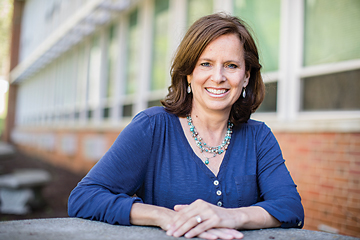Wednesday evenings tend to be met with dread in the Tucker household. The midweek blues have hit, and after a long, hard day of work and play and school, my husband and sons just want to relax and spend time together as a family. But Mama has other plans!
For the last three years, I have been working part-time on an advanced degree, which takes me away from my family one or two nights a week. My three men, while supportive of my endeavor, do not love the long hours I am away from home. There have been nights filled with tears, anger, and yes, even a kid trying to stow away in the backseat as I drove off to class.
The decision for anyone to go back to school is filled with doubt and lots of questions. Is it worth the money? The time? Will I succeed in what I am trying to do? Add a full- or part-time job on top of that, plus kids, and it becomes an even harder call. Parents have much to consider when deciding to insert being a student into an already complicated plot line.
Why Go Back?
Going back to school, in any capacity, is a commitment requiring a great deal of soul-searching and conversation with loved ones who will inevitably be affected by your ambitions. Before I enrolled in my program, my husband and I talked (a lot!) about what exactly I was trying to achieve with my pursuit of an advanced degree. Frankly, he didn’t want me to spend a lot of time away from my family (and a good amount of money) on something that was not going to amount to much in the end. He wanted to make sure I knew my end-goal.
Ashley Council of Chesterfield, a teacher, wife, and mom of two young boys was sure of her decision to go back and pursue a master’s degree because working toward the degree was something she always wanted to do. “As crazy as it sounds, I actually enjoy being a student. I enjoy setting and accomplishing my goals, and I really wanted to further myself professionally. I am ready to head in a new direction in my career.” She was also fortunate enough to have a husband who backed her completely. “All of this could not be accomplished if my family was not supportive.” Ashley acknowledges, “That was the first step I took before enrolling in the master’s program. I needed to know that my husband, Cooper, would support the long nights of studying and writing papers, and help take over some of the family duties as I put my energy into my class.”
Like Ashley, Tiffany Donovan, a wife and stepmother of one son, also started to get the itch to make changes in her profession after being a hair stylist for more than fifteen years. She recently graduated from ECPI with an associate’s degree in applied science for dental assisting. “I was burned out at the salon where I was working, and although I knew I could work out of my home and be okay, we were trying to move,” says Tiffany. “I needed to have a professional job that would help us qualify for a loan. Going back to school seemed like the best option,” says Tiffany.
Can You Do This?
Even if you have finally decided what goals you want to accomplish, you might still have doubts. That’s normal, according to Suzi Dougald, the director of student success for the UVA School of Continuing and Professional Studies (SCPS). She often asks her incoming students to be open to the new experiences returning to school will bring. “Many adult

students fear that they cannot succeed in a higher education environment, particularly if they have been away from the classroom for years – decades in some cases,” says Suzi. “At SCPS, we encourage our students to develop what is called a growth mindset. I try to disabuse them of the notion that they have to enter the program having all the skills and answers. Most adult students are accomplished in so many ways – as parents, employees, community leaders – and it is difficult to go into a situation as a learner.” According to Suzi, when adult students allow themselves to be open to new possibilities and approaches to learning, in spite of the discomfort the feeling of vulnerability may bring, it can be truly transformative.
Do You Have the Time?
Families today are on the go more than ever. Between work and school commitments, sports, and other extracurricular activities, prioritizing time to go back to school can be a tricky balancing act. Often, the other spouse takes on double the share of the duties from carpooling to homework to dinner. Single parents take on even more pressure as they face bigger time-management issues. Adult students are also faced with trying to find additional time to complete assignments outside the classroom.
John Childress, a husband and father of four who lives in Midlothian, worried about time the most when he decided to go back to school to obtain his bachelor’s degree in business administration. “Having four kids basically takes up all your free time,” John admits. He and his wife, Casta, had to do some proactive scheduling, meeting at the beginning of each week to discuss who was handling what responsibilities. “It wasn’t easy,” John says. “You have to make it a priority and, sadly, you have to put other things to the side. There are many late nights staying up after the kids are in bed, and weekends that are spent hunched over a computer screen.”
Ashley agrees that prioritizing is the most important part of keeping it all straight. “It takes a lot of commitment and putting personal enjoyment to the side, like shopping and going to movies. I have to prioritize on a daily basis what needs to be accomplished first. My family comes first. I try to work around their different schedules and complete schoolwork when I can. This usually happens after bedtime and on weekend mornings.”
Regarding time management, John discovered setting small goals first was helpful. “Once I achieved those, I was able to tackle the larger projects. This allowed me to manage my time better,” says John, adding that completing assignments as soon as possible after class was also a good strategy for him. “It allowed me to finish my work while the information was fresh in my mind, rather than procrastinating and having to go back and do research all over again.”
Tiffany was grateful for the support her husband provided when she would return home after long days of class and work. “It was exhausting to come home and immediately have to think about what we were having for dinner and what activities our son had to be at,” says Tiffany. “The most helpful part was my husband’s schedule. He is home by four every day, so he was able to get things started.”

Do You Have the Money?
You have set your goals, checked your confidence level, and figured out the time.Next comes reality: How are you going to pay for it? Suzi from SCPS acknowledges financial matters are one of the main reasons adults opt out of continuing education. “Higher education is expensive. As parents of children going to college, we are very resourceful about financing their education,” says Suzi. When it comes to their own education, however, adults returning to the classroom don’t realize many of the financial aid opportunities available to their children are also available to them. “I encourage all of my adult students to fill out the Free Application for Federal Student Aid (FAFSA) form, even if they don’t believe they qualify for any aid, and to research workplace educational and/or veterans benefits, as well as scholarships.” She says SCPS offers the Osher Reentry Scholarship, which is awarded exclusively to support adult students who are working toward completing their first bachelor’s degree after having been out of school for at least five years. Above all, Suzi advises, “Be curious about what might be available. Make Google your best friend.”
Online or In Person?
In 2017, there are more options than ever for someone hoping to go back to school. Between online programs, face-to-face programs, and hybrid programs (a combination of both), the search can be overwhelming.
As an adult with focus challenges, I knew a traditional classroom setting would be the best option for me. I needed to interact with professors and classmates in person. I also wanted to have easy access to networking with peers who were in my field. Recognizing how you learn can help you in making your decision. Many adults learn better with face-to-face time, while others are fine learning online. Think about how you learned best in high school or college. Did you enjoy interacting with your instructors, or did you prefer working by yourself on individual projects?
Ashley opted to attend the American College of Education, an online university, after careful research. “My husband does not have a set schedule at work, and I never know when he is going to be out of town or available to watch the children. Plus, it’s been great for me to complete my work when it’s convenient for me. Items are due on specific dates, but I can complete the task when I see fit,” says Ashley. “This allows me to spend quality time with my family, make dinner, help with homework, baths, and bedtime.”
Ashley does recognize the cons of learning in front of a screen. “Online classes can become boring and repetitive. In my program, each class is formatted the same, but goes over different content. I also am not able to make personal connections with others. This can become important when you struggle or need to bounce your ideas off someone.” Ashley says that if she were younger and didn’t have young kids, she would attend a college that is not online, but acknowledges, “For right now in my life, online is the best option.”
John opted for the more traditional route, and after finishing a year and a half at John Tyler Community College, he completed a bachelor’s degree at Averett University’s Innsbrook campus. He felt he could focus better when he attended classes in person, and enjoyed the networking opportunities. “You meet people in your field and make some great connections. I felt more disconnected when I took online coursework.”
Do Your Research
Regardless of the location, prospective students need to do careful research, making sure whatever program they choose is accredited by a regional accreditation agency. These agencies work to ensure learning institutions are being held to a high standard of quality for their students. You want to ensure the program you are about to invest your time and money in is going to be worth it in the end. Prospective students can visit the U.S Department of Education’s database of accredited postsecondary institutions and programs for accreditation verification (ope.ed.gov). Also, take time to talk to real students who have completed the program you are considering, and see how the program helped them advance professionally. It will be worth the conversation, and it may be a valuable networking opportunity for employment later.
Finally, Is It Worth It?
As funny as it might sound, I have come to treasure those quiet drives to Williamsburg each week. I call it my grown-up time – hours spent in class with others at the College of William and Mary who are passionate about what I am passionate about assures me I am doing the right thing.
Ashley treasures her special school-time too. “I have come to really enjoy drinking a cup of coffee in my PJs on a Saturday morning while writing a paper for my class. That is weird, right?” she laughs.
Tiffany, who will begin looking for full-time employment once she recovers from a hip injury, acknowledges attending school was a difficult journey. “I didn’t love going every day, but I enjoyed the internship I was able to complete at a local dental office,” says Tiffany, “and I was thrilled to receive my state certification.”
John’s degree helped him advance in his career, as well as taught his children to never give up on their own dreams. “I first started my degree program before my job and family got in the way. I had to step away from it for a few years, and I always wanted to go back. My kids saw me accomplish my goals, and that will be the biggest takeaway from all of it.”
I can only hope my back-to-school journey will be an inspiration to my boys later in life as well. One day, they will see their mother graduate with a doctoral degree in curriculum leadership and know that if she can accomplish her dreams, they can too. Until then, I should probably keep checking my backseat for little hitchhikers before I head off to class!





